Democracy and civil rights take a beating at 1st RIPTA Transit Talks Public Engagement Event
A rigged election, stifled protest, and an attempt to block the press were among the lowlights, never mind ignoring that the public wants the bus hub to stay in Kennedy Plaza...
“You can protest on the sidewalk but you can’t block the stairs,” said Amica Mutual Pavillion security to Lorraine Savard, a retired Central Falls schoolteacher and one of a small group of people protesting the Rhode Island Public Transit Authority (RIPTA)’s plan to move the bus hub out of Kennedy Plaza and to a much less convenient location.
“She’s not blocking the stairs,” I said. “There’s like six staircases and a ramp!”
The guard told me that he was not talking to me, but I persisted. “This is a public, government event, and she’s protesting it on public property. She has every right to be here.”
RIPTA is a quasi-public, independent authority, but is still beholden to both the Open Meetings Act and the Access to Public Records Act. It’s a “quasi-public” - emphasis on the public., but this is the problem when government groups hold public events on “private” property. Suddenly it isn’t an open, public space the public can access, it’s a private space where security feels they can flex their muscle against valid and legal protest. RIPTA moving their meeting onto public property sets up hurdles to protest, but also privatized the space where we could access our rights.
It’s not too dissimilar to the way RIPTA is moving the bus hub, helping a small group of wealthy real estate owners to steal a prime piece of public land - Kennedy Plaza - to be converted into a park for their pleasure. It’s a continuation of the enclosure movement, that time in Europe when titled royalty took ownership of large swaths of public lands and prevented common people from hunting or farming on it as they had for untold generations before. We don’t have royalty in Rhode Island unless you count the rich downtown building owners and developers like Joe Paolino and “Buff” Chase, who have decided as a class that poor people accessing transportation downtown is an affront to their aesthetics and threatens their viewshed.
Lorraine and the other six people protesting the event were displeasing the people who run the AMP, so of course security called the Providence Police Department when the protesters refused to move.
Inside the Transit Talks event, there were, among other features, eight easels showing the eight possible locations for a new bus hub. Each placard presented a rundown of the features each site had, with the following words at the top: “Proposed sites were chosen based on their potential availability, proximity to key activity centers, and accessibility to local and regional transit networks.”
After viewing the placards people were invited to vote for their top choice by dropping a small blue translucent chip into one of seven boxes. You could vote for any of the choices presented on the placards - except for Kennedy Plaza. A RIPTA spokesperson told me that they knew that most people wanted the bus hub to stay in Kennedy Plaza. They were hoping to determine everyone’s second choice. Presented with such an option, many people refused to vote at all.
An hour later, I saw the following tweet from Blaise Bailey Finnegan IV so I went inside to take my own picture of the box that suddenly appeared:
I was outside watching the Providence Police as they harassed and threatened the small group of protesters. I went inside to a picture of the box, but of course, it had been removed from the table. I saw it in the window, to the left of the table, but a young man helping to oversee the table stepped in my way.
“I just need to take a picture of that box,” I said.
“We aren’t letting that happen. That box has been removed,” said the man, who I am not naming because I’m sure he was just following orders.
I asked him to step aside, moving my camera to capture a photo. He moved his body to block my camera.
Undeterred, I went to RIPTA management and told them I needed a picture of the box. They deliberated for ten minutes, having hushed conversations with upper management. Finally, Christopher Raia, whose company was hired by RIPTA to help organize the event, walked me over to the table. It was now being run by a woman I hadn’t seen before, and the box was gone.
“Where is that little yellow box?” I asked.
“It wasn’t part of the display and has been removed,” said the woman.
“Did you put it in the trash?”
Looking at Christopher Raia, she produced the box from under the table and behind the curtain. She handed it over and I took my picture. It didn’t feel like a win.
Outside, the Providence Police had arrived in three squad cars for the small group of protesters WHO WERE NOT BLOCKING THE STAIRS, telling them they had to move because they were blocking the stairs.
The protesters were told that the owners of the AMP wanted them to move. I told the police that this was not a private event, it was a public event being put on by a public entity.
The cops didn’t care.
For the record, the AMP, previously known as the Providence Civic Center, was purchased by the Rhode Island Convention Center Authority, another quasi-public that is operated by the State of Rhode Island. It is much like RIPTA in this way and is governed under the Open Meetings Act and the Access to Public Records Act. If you want to know who owns the AMP, it’s the citizens of Rhode Island, just like RIPTA.
The small protest did move out onto the sidewalk, of course. No one wanted to be arrested. The police did an excellent job of intimidating and threatening the six or seven people on public property exercising their rights and protesting their government.
The Rhode Island Transit Riders, a public transportation advocacy group, issued a statement at the event.
“RI Transit Riders strongly opposes the construction of a new bus hub at this time. We prefer to stay in a cleaned-up Kennedy Plaza with better amenities.
“We would only support spending money for the construction of a new hub if it met riders' needs for convenience and safety AND if the state first commits to greatly increasing RIPTA's funding to improve bus service throughout the state.
“Passengers want greater frequency of buses and system improvements, as called for in the long-range ‘Transit Master Plan,”’ not a new hub.”
The protesters outside had a small election going, which was much simpler and much more democratic than the one RIPTA was running inside. Passersby were invited to choose between two options and stick a pin in a corkboard as their vote. By the end of the day, after this picture had been taken, the option of moving the bus hub had secured a few votes, but the option to keep the bus hub in Kennedy Plaza won the election 54 to 8.
I also ran into Richard Stang, a lawyer for the Conservation Law Foundation (CLF). He handed me their statement, which was a series of pointed and important questions.
“According to RIPTA's April 23, 2024 press release, this Transit Talks Event is designed to seek ‘public input on the development of a new, state-of-the-art transit center in Providence.’ In particular, “The new transit center would serve as RIPTA's central bus depot, providing millions of trips annually, and considering anticipated growth, the transit center will feature a state-of-the-art temperature-controlled passenger arrival and seating area, staff break areas, and amenities including multi-modal accommodations for bicyclists.’ Based upon the stated purpose of this Transit Talks Event:
Does RIPTA have any requirement to also participate in the development, ownership, and financing of transit related housing or commercial development at the site of this new transit center?
Does RIPTA have to own, or can it lease the site of this new transit center?
Is Kennedy Plaza being evaluated as a potential home for this new transit center?
If the overarching objectives of developing a new transit center are to enhance the ridership experience and expand RIPTA service, why would RIPTA consider the Parcel 35 site which is overwhelmingly disapproved by current RIPTA ridership as worsening the ridership experience and seriously hampering RIPTA's ability to expand service?
If most of the public input into the development of the new transit system shows that ridership prefers to stay in Kennedy Plaza to best improve the ridership experience and RIPTA's ability to expand service, will the new transit system be developed in Kennedy Plaza?
As we can see from my experiences at the Transit Talks event, most of these questions do not have promising answers.




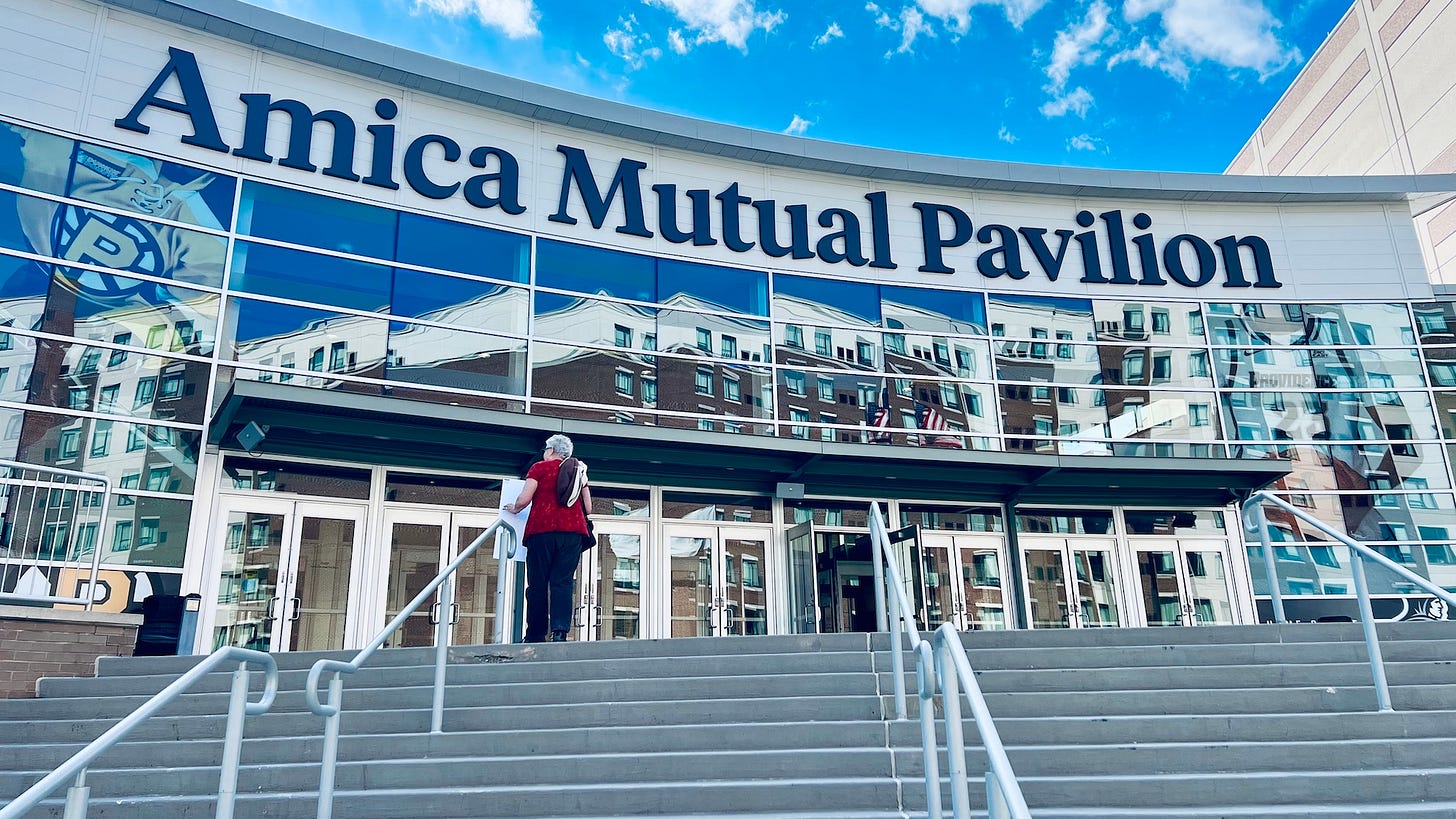

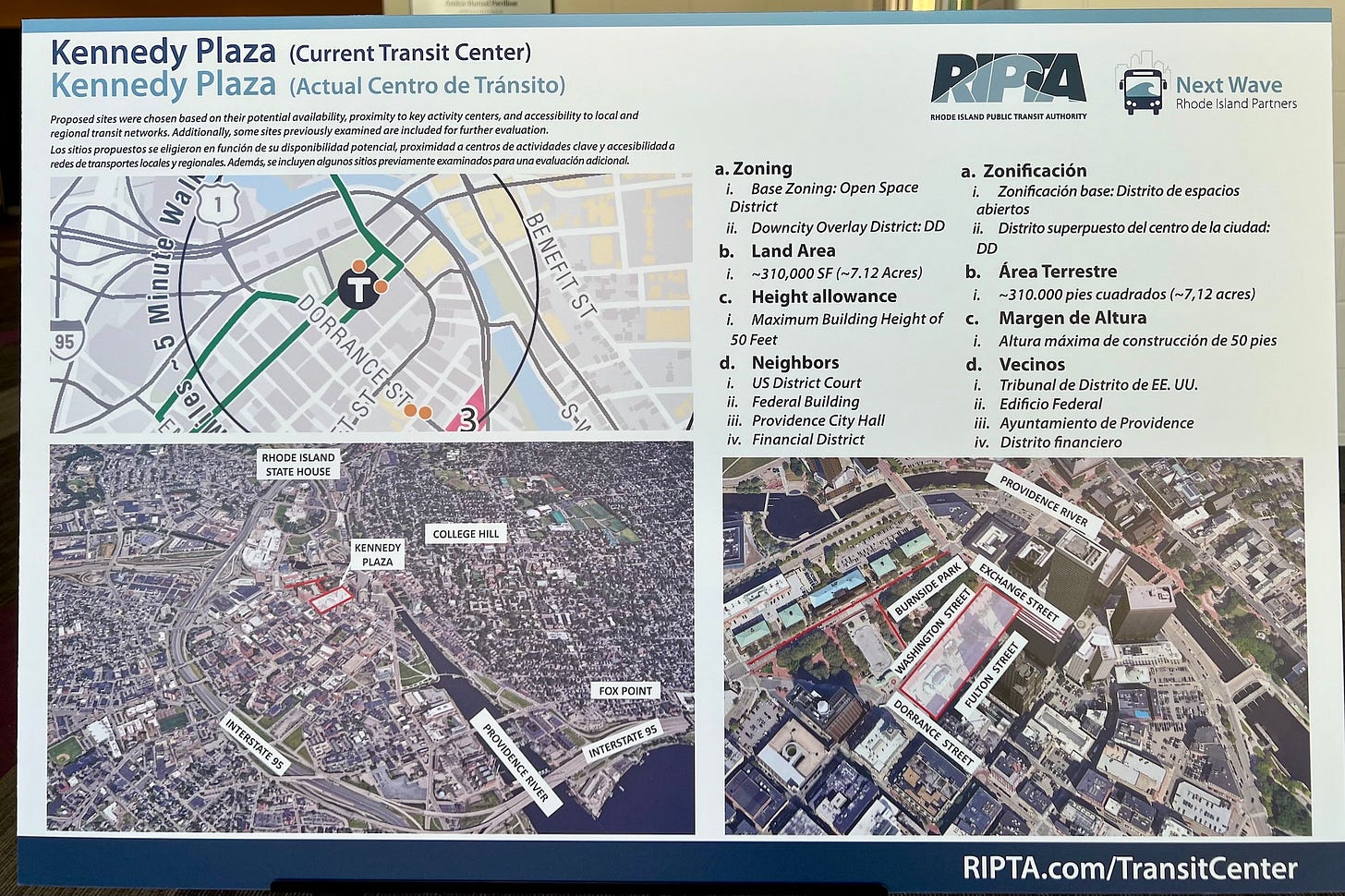

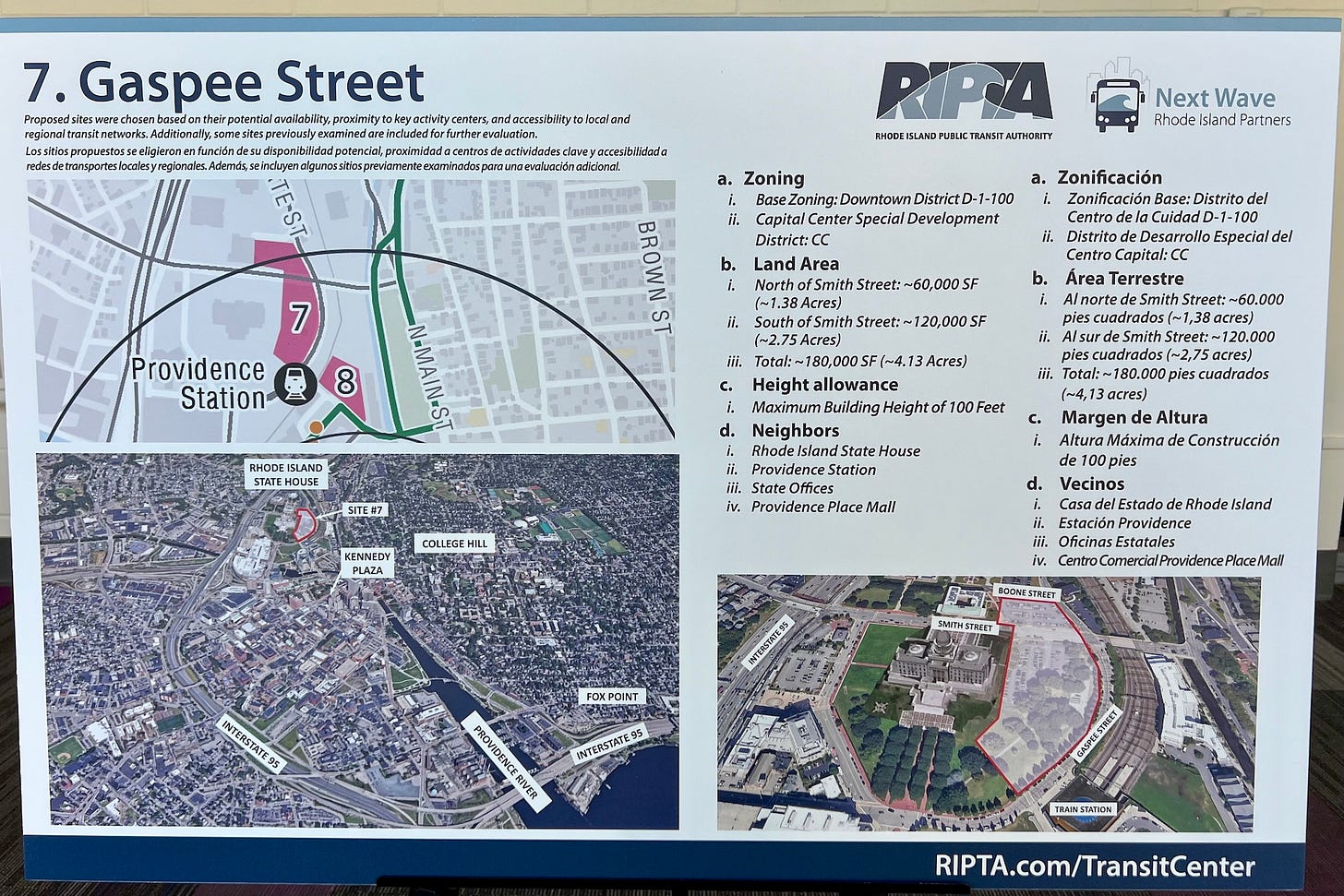
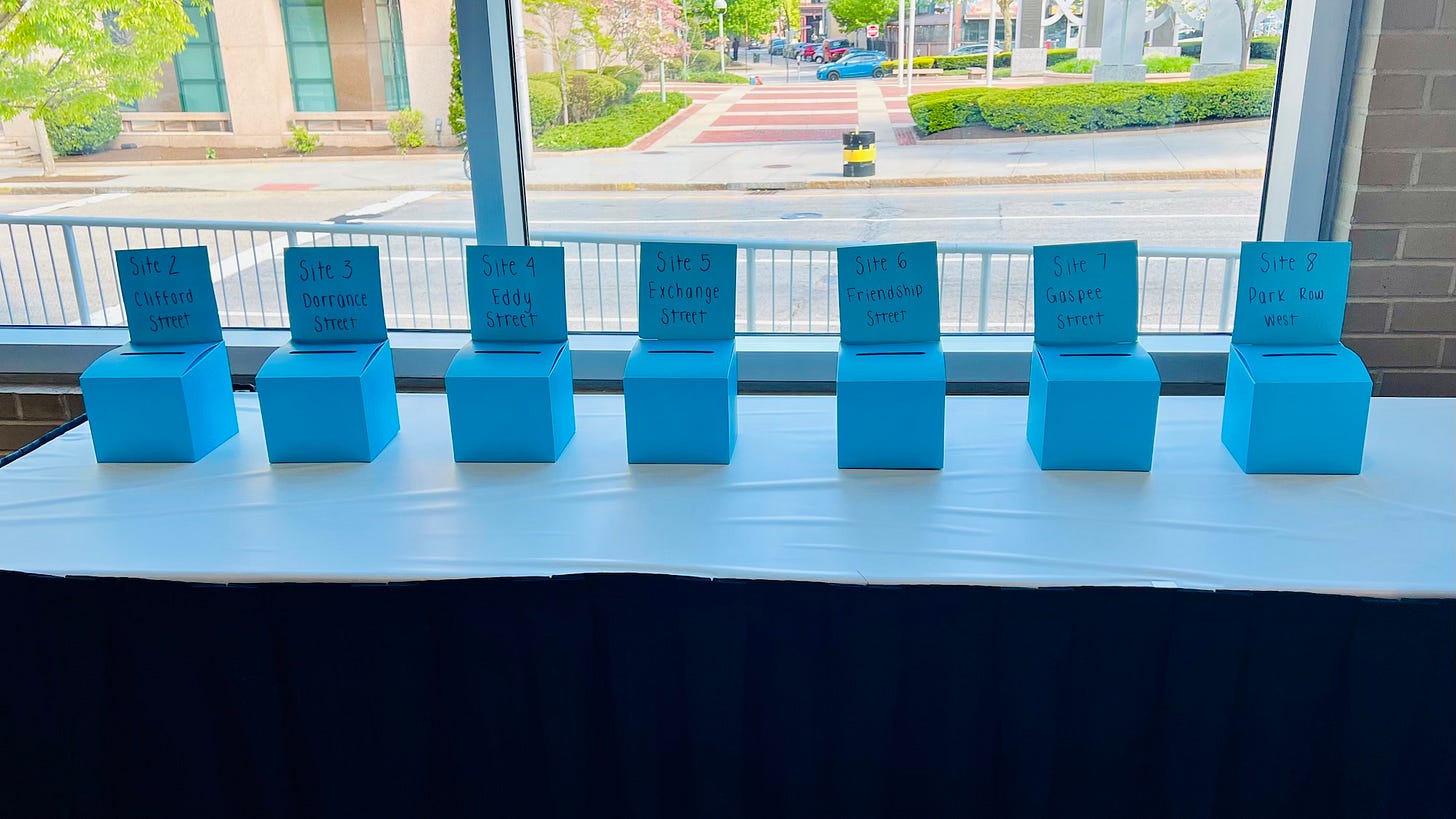

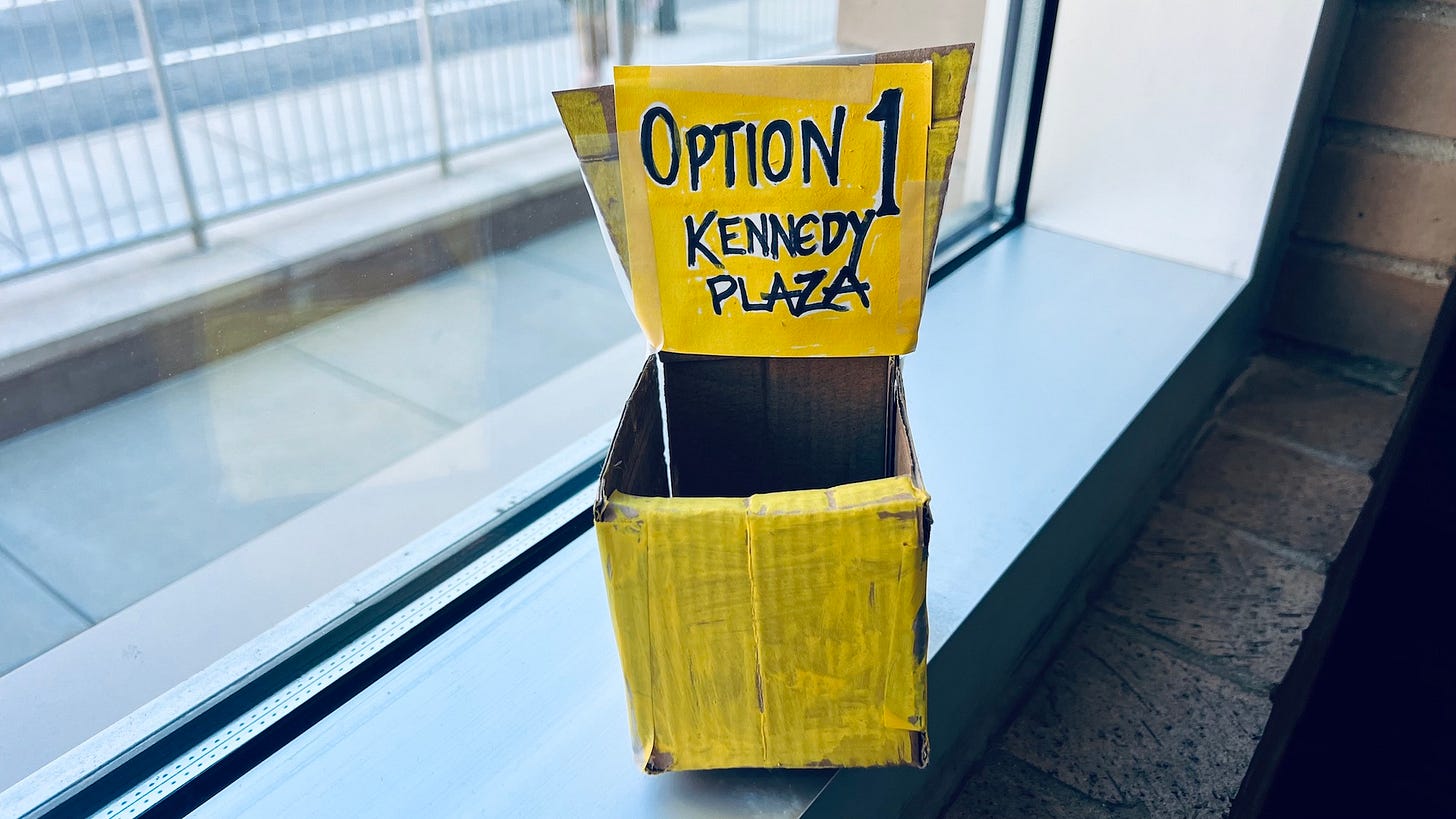

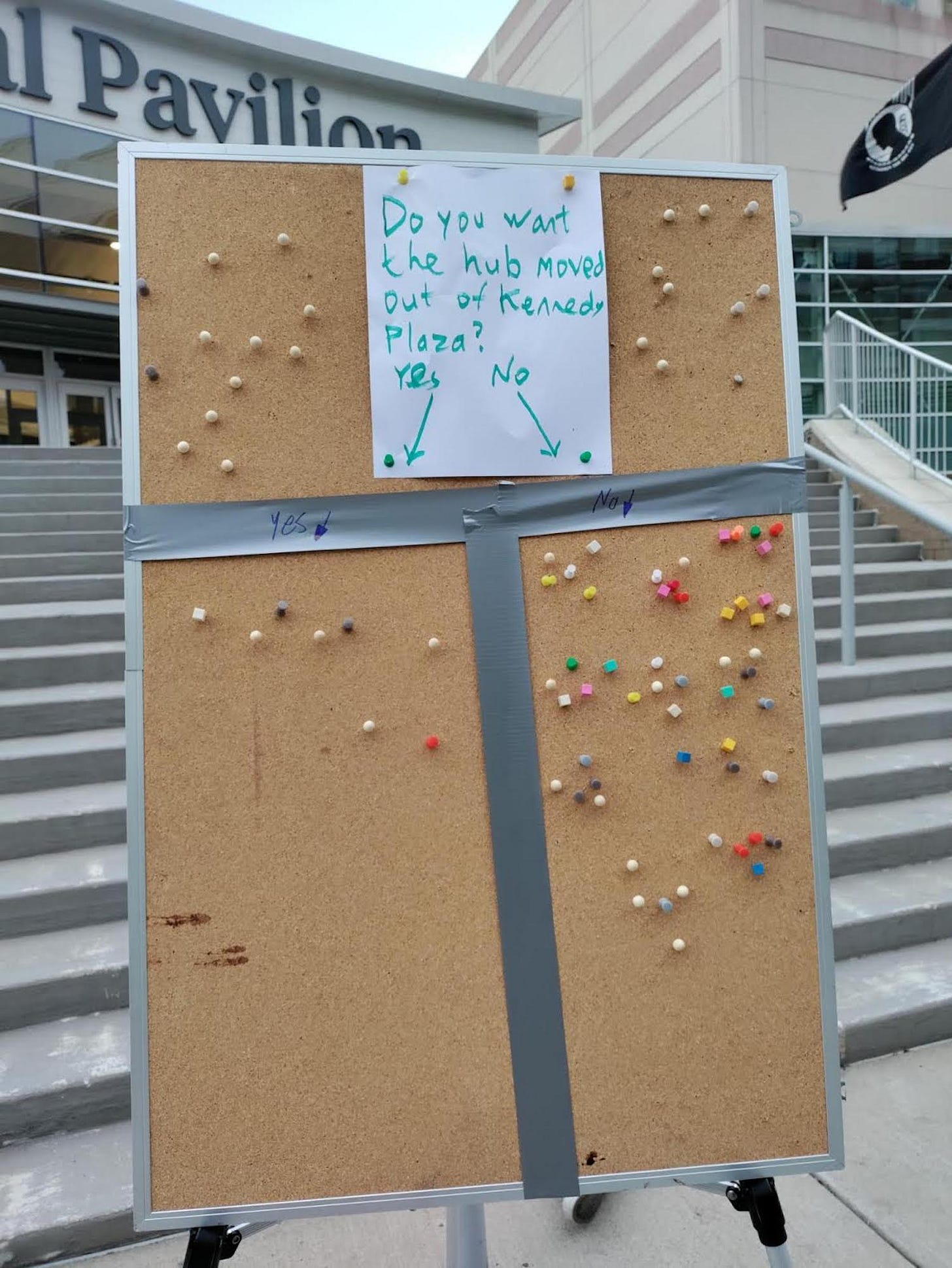

great coverage Steve (as usual!)
Another concern is that some reports say the results of the public preference that was allowed may not be made public.
I do suhhest some nuance - I don't think its so much that RIPTA wants to help the politically connected downtown realtors as much as that they are a weak ahency dependent on the power structure for financing and they have little leverage to resist. Their Board is appointed by thr Governor and mostly they will try to please the Governor who is so influenced by those downtown realtors.
Also, Kennedy Plaza is not without problems, one being it is rather spread out - some find it daunting to have to walk across Burnside Park to some stop locations, especially after dark or in bad weather. It also has been given a bad reputation by actual, perceived, or hyped up reports of criminal and scary behavior. I for one have found it hard to persuade some people to take a bus downtown because of the KP rep.
What is also sad about this is that the downtown business community and the Providence Mayor see transit as a negative rather than their one transportation advantage, and its potential to reduce congestion, pollution, climate emissions and accidents. Not all downtowns have this attitude, for example downtown Columbus OH businesses were promoting transit for their employees by payng their fares (before covid hit) while RIPTA's employer "ecopass" program has gotten only miniscule support.
I had to edit the vote count that I estimated after recieving final results from Randall Rose, who organized the outside protest.